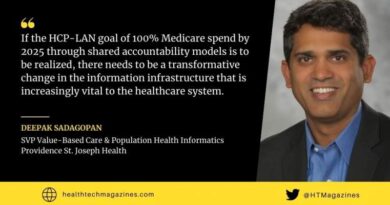Advancing Pediatric Population Health, Powered by Technology
By Kara Odom Walker, MD, MPH, MSHS, SVP & Chief Population Health Officer, Nemours Children’s Health System
America’s children are the key to whether or not we will have healthier families and healthier communities in our future. Their care, opportunities, and resulting behaviors will all have serious long-term ripple effects–good and bad. With a population health approach that is aided by powerful technology, we can put children at the center and change our nation’s health trajectory for years to come.
Nemours Children’s Health System believes that children’s hospitals and health systems possess the expertise, trusted relationships, and necessary infrastructure to serve as stewards of children’s health, creating a healthier, more productive future for all. Our approach utilizes the right tools and resources to scale a population health approach far beyond our direct patient care activities.
Population Health
Medical care makes up a very small percentage of our individual health. Research shows that the community context and lifestyle factors such as nutrition, safe housing, a clean environment, supportive family relationships, and access to quality early education are all critical for children to thrive. These social determinants of health are the fundamental conditions in which people are born, grow, live, work, and age. Their impacts are far-reaching. They can increase risks for pediatric health problems and have been shown to cause chronic adult health problems among the key drivers of health disparities.
We have adapted our strategy and our entire system to better support families’ needby directly addressing these crucial community, social, and lifestyle factors. We are innovating whenever and wherever we can, expanding our most effective initiatives quickly. As a result, we have been better able to identify patient and family needs, increase access to care, and reduce health care spending. But we can do even more.
Our CareConnect telehealth program is a critical tool that our busy families use to receive clinical care and treatment options.
Using Technology to Drive Value-Based Care for Population Health Goals
Nemours has long employed the latest technologies to improve patient outcomes. Few U.S. hospitals have achieved the advanced functionality of our Electronic Health Record (EHR) system. It helps us identify families most in need, improve their access to care, and support our increasingly effective efforts to connect them to resources—all in strong support of our population health goals.
- Identifying Families in Need: We have developed a screening tool, embedded within our electronic health record, to assess nonmedical health factors such as food insecurity, finances, social support, neighborhood safety, health literacy, and more. Challenges in these areas are recorded in patient medical records, just as any other part of their medical history, to ensure our providers see and care for the whole patient and address issues vital to their future. We can also immediately use this data to identify patients who may need additional support and with their consent, provide that intervention early.
- Accessing Care: We are investing in new ways to integrate social determinants of health into routine care across our system. Our CareConnect telehealth program is a critical tool that our busy families use to receive clinical care and treatment options. We are identifying families who have transportation issues or cannot get off time from work to attend appointments so that we can make sure they can access care for their children via telehealth.
- Connecting with resources: Going beyond identifying nonmedical needs, we are building on our partnerships in the community to connect families experiencing problems with nonmedical health factors—such as transportation or unstable housing—to the necessary resources. We are also in the early phases of developing geocoding capabilities that will help us to focus and prioritize our population health efforts with communities or even specific neighborhood blocks.
Health Tech in a Pandemic
The impact of this pandemic has been devastating, disproportionate for children and families depending on their race, ethnicity, and income. As of mid-September, 400,000 youths under 21 have contracted COVID-19, and 121 have died, according to the Centers for Disease Control and Prevention. More than 75% have been Hispanic, Black, and American Indian children of those who have died.
We know that this virus is putting immense stress on families and children across various issues: schooling, food insecurity, financial distress, and mental health. In schooling, virtual education may worsen achievement gaps among lower-income and minority populations who have less access to resources, including broadband necessary to access remote learning opportunities. The digital divide is real. And food insecurity is exacerbated when school meals are missed. We also know that the short and long-term impacts among families create countless unhealthy outcomes. All this has sharply increased the incidence of stress among children. Health systems must address the mental health consequences of COVID-19 through programs not only within hospitals, but also where children live, learn, and play.
As we have watched this tremendous need unfold, Nemours turned to its long-term investments in technology to help us find new ways of promoting population health. We were able to quickly deploy telehealth across primary care and all of our specialty care to keep our youngest patients healthy. In the early weeks of the pandemic, we trained more than 700 clinicians in the use of telehealth and saw a 2400% increase in telehealth visits. Preliminary data suggests that these visits have substantially improved appointment “show rates” for children covered by Medicaid.
Nemours plans to explore whether our novel “tele-well” visits that pair virtual video visits with short in-person physical exams, targeting those who require vaccinations, can be continued beyond the pandemic to better serve families who lack adequate transportation. Some payers in Delaware and Pennsylvania have begun reimbursing providers for clinical visits conducted via telehealth. Wider and continued use of this technology could become a positive legacy from the pandemic, improving efforts by all health systems to promote better population health and reduce disparities.
Population health is the key to making all of us healthier, and children’s health is foundational to achieving population health. Technology is key to collectively reaching that goal, transforming our health care system into one that helps all children reach their full potential.



